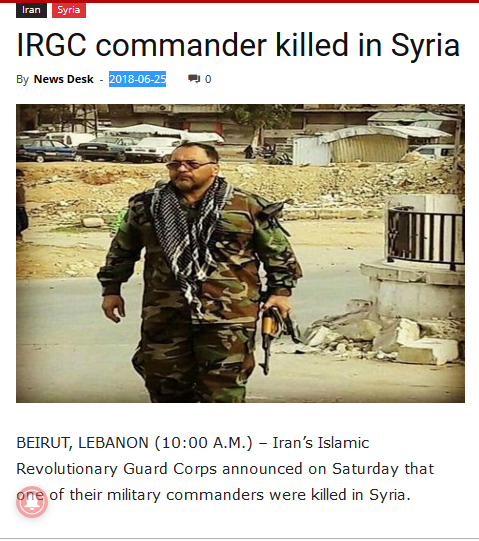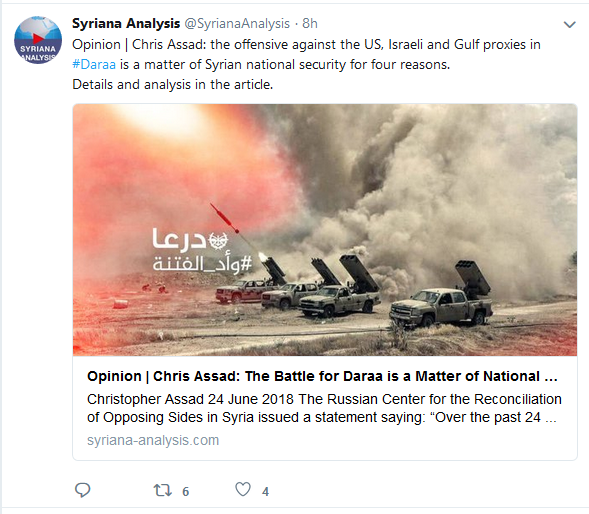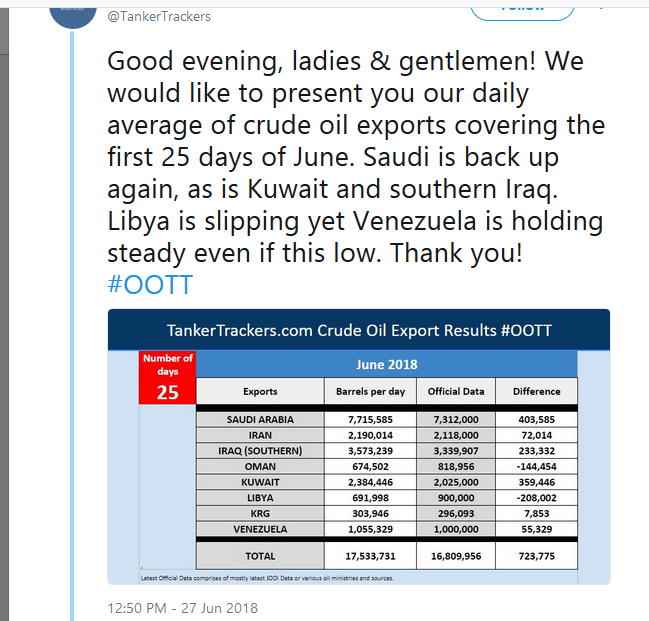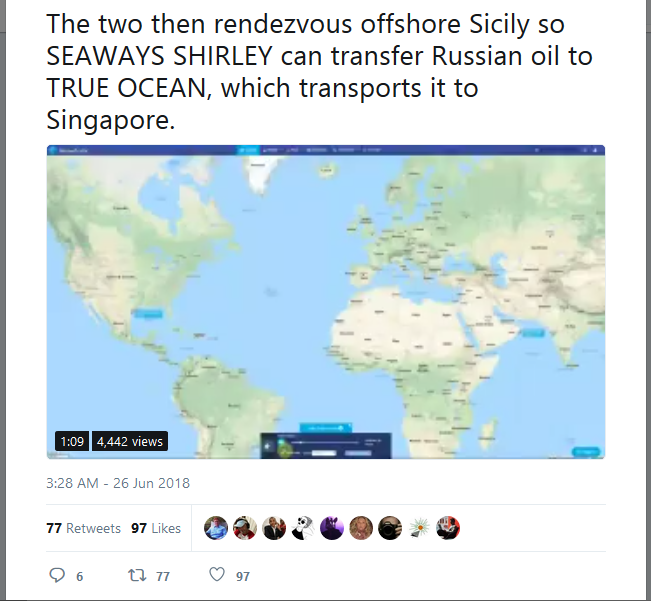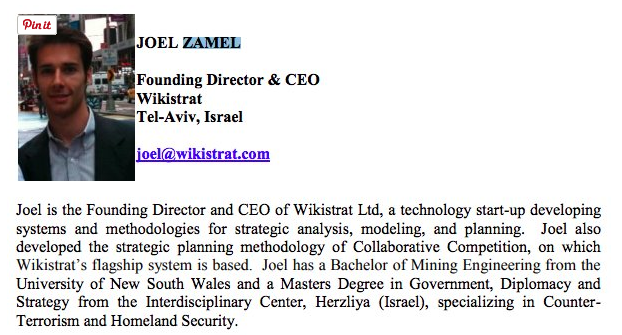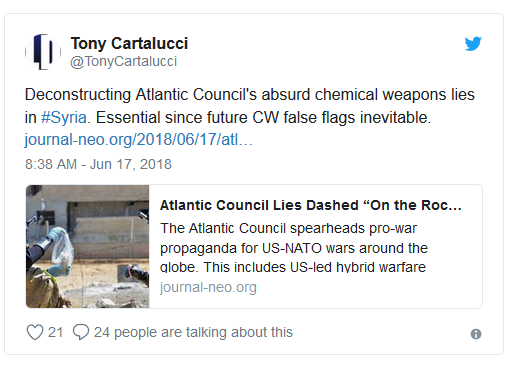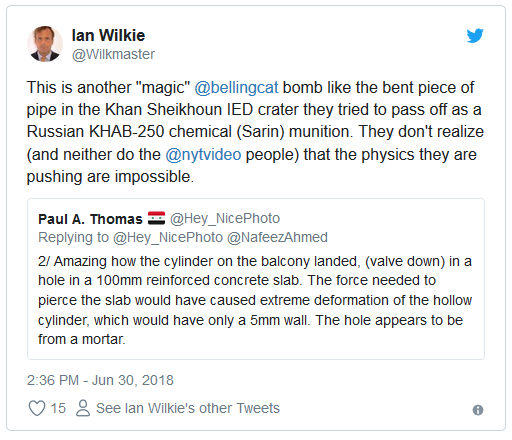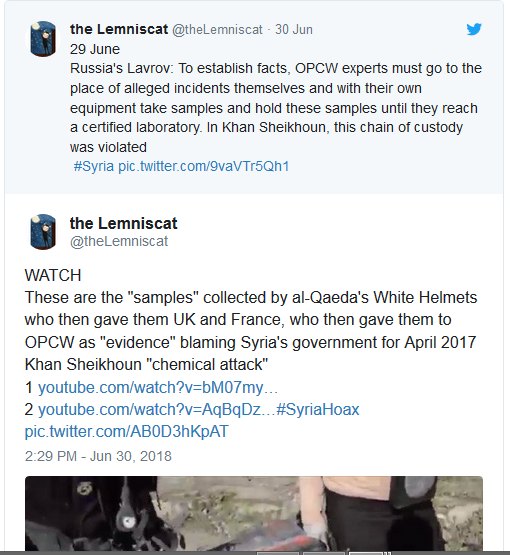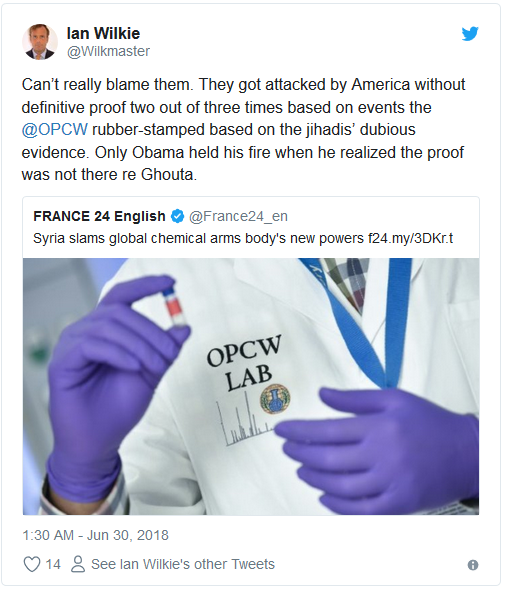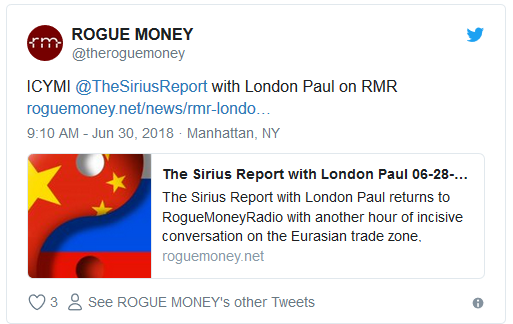The mission to probe the fact of chemical weapons use in Syria has strongly protracted the timing of the investigation in favor of the US and their allies’ interests, the Russian Defense Ministry stated.
22.06.2018 - Equipment in Syria's Douma Chemical Lab Made in EU, N America - Russian MoD
Equipment in Syria’s Douma Chemical Lab Made in EU, N America - Russian MoD
Chemical weapons in Syria were produced by militants and equipment was manufactured in Western Europe, said Russian Foreign Ministry spokeswoman Maria Zakharova.
"The equipment, the leakage of which came out a few days ago… I would like to say that some of it is equipment that was used by militants, terrorists. It was discovered in the city of Douma," Zakharova said at a briefing of the Russian Foreign Ministry and the Ministry of Defense for the diplomatic corps to investigate the use of chemical weapons in Syria.
The militants' chemical lab in Syria's Douma produced high-tech pentaerythritol tetranitrate (TEN) explosives and also had precursors of mustard agent and chlorine, Maj. Gen. Igor Kirillov said.
"With the help of this equipment, [militants] produced high-tech and high-quality TEN explosives. During the search of the lab, [the Russian military] also found thiodiglycol and triethanolamine, which can be used for the production of sulfur and nitrogen mustard, as well as hexamine," Kirillov said at a briefing on the investigation into the use of chemical weapons in Syria.
Kirillov added that the military had also found a chlorine gas cylinder, similar to the one used by militants in the staged chemical weapons attack in Douma.
Equipment in Syria’s Douma Chemical Lab Made in EU, N America - Russian MoD
Some equipment parts for the synthesis of a mustard agent, which had been found in militants’ chemical laboratories in the Syrian city of Douma, were produced in the European Union and North America, Maj. Gen. Igor Kirillov said.
"We would like to draw your attention to the fact that certain parts of the equipment and reagents were produced in the EU and North American countries," Kirillov told a briefing, held jointly by the Russian defense and foreign ministries.
Cylinders from the scene of the alleged chemical attack in the Syrian city of Douma were only sealed by OPCW representatives a month and a half after the incident took place, in violation of the OPCW standards, Kirillov noted.
What kind of results can we expect from a Fact-Finding Mission investigating this incident that has already led to a massive missile strike by the US, UK and French aircraft on the territory of the sovereign state in violation of international legal mechanisms? Obviously, they are preparing yet another accusatory report based on pseudo-evidence," Kirillov stressed.
In April, the fact-finding mission of the Organisation for the Prohibition of Chemical Weapons (OPCW) has visited a site in the Damascus suburb of Douma to collect samples in connection with the alleged April 7 chemical attack.
The footage presented by the White Helmets has been confirmed as fake by a boy who was filmed and his father, as well as another boy who got food for taking part and a doctor at Douma's hospital where the shooting took place.
Russian servicemen have found no evidence of any attack at the site but discovered a militant laboratory equipped for producing chemical weapons.
US, UK, France, Allies Trying to Turn OPCW Into Politicized Institution
"While conducting investigations into chemical incidents in Syria, compliance with a strict sequence of actions to preserve evidence has been violated," Maj. Igor Kirillov, chief of the Russian Armed Forces' Radiological, Chemical and Biological Defense Troops, said.
The Russian Defense Ministry’s representative stressed that the neglect of the OPCW standards "led to contradictions, inconsistencies and falsifications of facts in the reports on the results of investigations, which are clearly anti-Syrian in nature."
"The United States, the United Kingdom, France and their allies are again misleading the international community and are striving for confrontation. Using staged chemical attacks they accuse Syria of violating the [Chemical Weapons] Convention, and Russia of facilitating this [violation]. Against this background, a campaign has been organized to turn the OPCW into a politicized structure that has the authority to issue strict guilty verdicts against individual states and their leaders," Kirillov said.
He stressed that "the OPCW Fact-Finding Mission into the use of chemical weapons in Syria, which is carrying out investigations depending on the United States and its allies, plays an unenviable role here."
"In order to satisfy the interests of the United States and its allies, the mission delayed the investigation of the incidents in every possible way, and the final report on the Ltamenah incident was published one and a half year after the incident. [It was done] only to use this fact to advance the decision about giving the OPCW the 'pseudo-judicial' functions of appointing the perpetrators and determining the punishment," he said.
Damascus has repeatedly refuted the allegations of the chemical weapons use, saying that the full destruction of its arsenal was confirmed by the OPCW in 2016.
According to Kirillov, the productive position of Syria and Russia, the desire for dialogue with the OPCW have been confirmed by the efforts made to provide comprehensive assistance and support to the mission to establish if chemical agents were used in Douma.
More than 40 tons of poisonous substances were found on the territories liberated from terrorists in Syria in 2017, the Organization for the Prohibition of Chemical Weapons has invariably declined requests by the country’s authorities to conduct inspections in militant warehouses with poisonous chemicals, Kirillov said.
White Helmets Used Low-Grade Bomb in Khan Shaykhun in 2017, Not Chemical Weapons
The White Helmets used a low-grade explosive device in the Syrian settlement of Khan Shaykhun last year to stage a chemical weapons attack, later blamed on the Syrian government forces, Maj. Gen. Igor Kirillov, chief of the Russian Armed Forces' Radiological, Chemical and Biological Defense Troops, said.
"The characteristics of the crater show that it was formed as a result of the detonation of a land-based low-power explosive device, rather than an aviation bomb launched from an aircraft," Kirillov told a briefing.
Kirillov pointed out that the crater had been cemented before the investigation of the incident could finish.
The Russian military commander mentioned photos and videos showing people in the first hours after the attacks without any special protective clothing.
"This points to the absence of sarin in the crater as there is usually a lethal concentration [of a chemical agent] inside and around a crater after a chemical weapon has detonated, and the people close to it as well as those who were helping the injured would not have been able to avoid exposure," Kirillov said.
An analysis of photos of munition, allegedly used in the chemical attack in Syria's Al Lataminah, has shown that these were fragments of a conventional blast bomb, not a chemical one, he stressed.
"A crater by an explosion is different from what could have been done by an explosion of air-dropped chemical munition and suspiciously resembles a crater by an 'air-dropped chemical munition' faked by the While Helmets in Khan Sheikhun," Kirillov told a briefing, held jointly by the Russian defense and foreign ministries.
Provocateurs Added Sarin to Samples to Blame Alleged Chemical Attacks on Damascus
Sarin chemical agent was added to samples from Syria by provocateurs in order to further accuse the Syrian government forces of carrying out chemical attacks against civilians, Maj. Gen. Igor Kirillov, the chief of the Russian Armed Forces' Radiological, Chemical and Biological Defense Troops, said.
"In our opinion, it [sarin] was purposefully added to the samples by provocateurs in order to accuse the Syrian government forces," Kirillov said.
The Russian side, as well as the Syrian government, have warned repeatedly about the possibility of opposition provocations in the form of an alleged chemical attack.
Chemical Incident Probes in Syria Without On-Site Visits Unprofessional
Investigations into alleged chemical incidents in Syria's Khan Shaykhun, Saraqib and Ltamenah without on-site visits cannot be called professional, Maj. Gen. Igor Kirillov, chief of the Russian Armed Forces' Radiological, Chemical and Biological Defense Troops, said Friday.
"Holding investigations into alleged chemical incidents in Khan Shaykhun [April 4, 2017], Saraqib [February 4, 2018] and Ltamenah [March 24, 25, 30, 2017] and making conclusions on them without on-site visits, shows a non-professional approach," Kirillov said at a briefing.
Kirillov noted that the reports of international investigators are full of such words as "probably," "possibly," or "we can assume."
"Such vocabulary is inadmissible for a serious document, which must be based on irrefutable evidence," the Russian official explained.
According to Kirillov, compliance with a strict sequence of actions to preserve evidence has been violated during the investigations as well.
"While holding investigations into these incidents, the fundamental principle of permanent control was violated, namely, the Chain of custody, which prescribes the necessity to follow a strict sequence of actions to ensure the preservation of evidence," Kirillov stressed.
The Defense Ministry's representative stressed that the neglect of the standards of the OPCW "has led to contradictions, inconsistencies and fabrication of facts in investigation reports that have a clear anti-Syrian nature."
According to Kirillov, two designated OPCW laboratories, which analyzed the samples handed over to the OPCW Fact-Finding Mission by the White Helmets, received contradictory results.
In February, the Russian Center for Syrian Reconciliation received information from a local resident in a village in Idlib that Al-Nusra Front* terrorists and White Helmets, the so-called Syrian Civil Defense, were preparing to stage a provocation involving the use of chemical weapons and blame it on Damascus.
Kirillov emphasized that "one laboratory found organic chlorine elements in 14 samples, while another laboratory did not find them at all." According to Kirillov, a number of samples contained traces of explosives, but eyewitnesses reported that there was no explosion of the balloons.
"The samples contained chemicals that cannot be explained either as natural elements that can be seen in the environment nor as related to chlorine… In our opinion, the only explanation for the presence of these substances in the samples is that they were deliberately put there by the White Helmets, who handed these samples to the OPCW Mission," he said.
Damascus Destroyed Chemical Weapons Facility in June, 1 Last Place Left
The Syrian authorities have dismantled a facility in Al Maliha related to the former chemical weapons program on June 8, one last facility still awaits destruction, the chief of the Russian Armed Forces' Radiological, Chemical and Biological Defense Troops, said Friday.
"Syria is doing everything possible to meet all the objectives it assumed on dismantling the facilities linked to the former Syrian military chemical program. One facility, in Al Maliha, was destroyed by the Syrians on June 8, 2018, after they failed to receive assistance from the Organization for the Prohibition of Chemical Weapons, and the proof was sent to the OPCW," Kirillov noted.
According to Kirillov, the Syrian authorities are currently working on dismantling the last remaining facility, in Tel Kurdi.
The situation in Syria seriously escalated in several months after a number of media outlets and Western countries blamed Damascus for using chemical weapons in the town of Duma.
The Syrian government and Russia have denied the accusations, saying that the alleged attack in Douma was staged by militants and the White Helmets organization to influence public opinion and justify possible foreign intervention.
Despite this, on April 14, the United States, France and the United Kingdom carried out a missile attack on a number of targets in Syria, including the facilities in Barzeh and Jamraya, in response to the alleged attack in Douma.
According to the Russian Defense Ministry, a total of 103 cruise missiles were launched by the United States and its allies, 71 of which were intercepted by Syria's air defense systems.
*Tahrir al-Sham (also known as Jabhat al-Nusra) is a terrorist group banned in Russia.
Jun 22, 2018 - Russia’s Defense Ministry: OPCW missions in Syria violate Chemical Weapons Convention
Russia’s Defense Ministry: OPCW missions in Syria violate Chemical Weapons Convention
Russia is trying to help the OPCW to overcome systemic failures, the general said.
The OPCW’s missions in Syria violate the provisions of the Chemical Weapons Convention, Major-General Igor Kirillov, Chief of the Russian Armed Forces’ Radiological, Chemical and Biological Defense Troops, said on Friday.
"The remote nature of investigations as well as the collection, analysis and use of the documents obtained without specialists’ trips to the alleged sites of chemical weapons use, is in direct contradiction to the Convention’s provisions," Kirillov told reporters at a joint press briefing of the Russian Foreign Ministry and Russia’s Defense Ministry.
He noted that the West seeks to grant the Organization for the Prohibition of Chemical Weapons (OPCW) the right to issue guilty verdicts against certain countries and their leaders.
"The United States, the UK, France and their allies are once again trying to mislead the global community and seek confrontation," he said. "Taking advantage of staged chemical weapons attacks, they accuse Syria of violating the Chemical Weapons Convention and Russia of complicity in that. At the same time, a campaign has been launched to turn the OPCW into a politicized institution with the right to issue guilty verdicts against certain countries and their leaders," Kirillov said.
He added that the OPCW Fact-Finding Mission on the use of chemical weapons in Syria, which conducts its investigations relying on the US and its allies, plays an unsavory role.
Douma incident
Russia is concerned that the western investigation into the April chemical weapons incident in Syria’s Douma will result in groundless accusations against Damascus, Kirillov said.
He pointed out that at the West’s behest, the White Helmets had acted in accordance with a scenario tested in Khan Shaykhun in 2017, staging a chemical weapons attack in Douma on April 7, 2018. Russian experts assessing information about the incident came to the conclusion that it had been orchestrated, the Russian general said.
"Clearly, preparations are being made for presenting another accusatory report that would contain no evidence," Kirillov noted.
A number of non-government organizations, including the White Helmets, alleged that a chemical weapons attack had taken place in Eastern Ghouta’s town of Douma on April 7. The Russian Foreign Ministry slammed this allegation as a bogus story, while Russia’s Defense Ministry pointed out that the White Helmets were known for spreading fabricated news. On April 9, officers from the Russian Center for Reconciliation of the opposing sides in Syria visited Douma but did not find any traces of chemical weapons.
On April 25, Moscow and Damascus held a briefing at the OPCW headquarters, which particularly involved 17 witnesses to the events that had occurred in Douma on April 7. They confirmed that there had been no chemical weapons attack while the video released by the White Helmets had been staged.
Other shortcomings in OPCW work
Laboratories belonging to the OPCW have presented contradictory information concerning an alleged chemical weapons incident in Syria’s Saraqib in February 2018, as one group of experts found chorine traces in samples, while the other did not, Kirillov said.
"One of the laboratories found chlorine-organic compounds in 14 samples, while the other did not any traces at all," he said. "A thing to note is that a number of samples had traces of an explosive substance though according to eye witnesses, there were no explosions of tanks allegedly containing chlorine," the Russian general added.
The OPCW is reluctant to send experts to the liberated areas of Syria in order to examine militant chemical agent stockpiles, Kirillov said.
"More than 40 tonnes of chemical agents have been discovered in areas liberated from terrorists," he said. "Syrian authorities have many times requested that the OPCW send experts to these areas but the organization either refused to do that citing the lack of security or said that chlorine, in particular, could have been used to disinfect swimming pools," the Russian general said.
At the same time, in Kirillov’s words, the equipment found at a militant chemical facility in Douma was made in EU member states and North American countries. A mined chemical laboratory and a chemical warehouse were discovered on April 17, 2018. "OPCW experts were provided with an opportunity to visit both of the facilities but for obvious reasons they did not show due interest," the general noted.
"We would like to point out that some equipment and treating agents were made in EU member states and North American countries," he said, adding that the equipment had been used for producing a high-quality explosive substance. Besides, thiodiglycol and triethanolamine used for manufacturing sulfur mustard gas and nitrogen-mustard gas were also found in the laboratory, as well as the hexamine stabilizer and a tank containing chlorine, similar to the one that militants used while preparing to stage a chemical weapons attack.
The general also said that biomedical samples in Syria’s Al Lataminah were collected with the same violations as in the Skripals case.
"It should be emphasized that the procedure for selecting biomedical samples has been violated once again, the way it was in the Skripals’ case. We all remember that all media outlets reports that the mission, which came to Salisbury and which selected the samples, did it personally. Paragraph 19 of a report (on Al Lataminah - TASS) states that blood sampling was carried out by the hospital’s staff under the supervision of a medical expert group using OPCW equipment," he said.
Russia's position
Russia is trying to help the OPCW to overcome systemic failures and flaws and cares about the organization’s reputation, according to Kirillov.
Russia always seeks to use specific facts and arguments whereas "Western opponents usually avoid a substantive talk and reply with slogans," accusing Russia of undermining the OPCW’s prestige and reputation, the general told a joint news briefing of Russia’s Foreign and Defense Ministries.
"The Russian Federation, on the contrary, cares about the OPCW’s reputation and seeks to help this organization overcome systemic failures and drawbacks and prevent a politicized and biased approach in its work," the general said.
Russia holds a clear-cut and unambiguous position: the use of chemical weapons in the world is inadmissible and those guilty of their use must be held liable, Kirillov stated.
"Russia has fulfilled all its obligations and destroyed all its chemical weapons," the general said.
Wed Jun 20, 2018 - Russia’s Chief Negotiator Vows Russian Continuation of Anti-Terrorism Operations in Syria’s Idlib
Farsnews
Moscow is interested in the stabilization of the situation in Syria’s Idlib and is set to continue efforts to exterminate terrorists in that region, Russian President’s special Envoy for Syrian settlement Alexander Lavrentyev said after a meeting of the three Syrian ceasefire guarantor nations (Russia, Iran and Turkey) in Geneva.
"The situation in Idlib is alarming because of the great number of militants, including Al-Nusra Front terrorists are staying there," Lavrentyev said, TASS reported.
"Turkey has undertaken to stabilize the situation there, to prevent possible provocations, attacks on government forces and stop flights of drones. We hope the situation around Idlib finally stabilizes. It in no way means we are stepping back from the problem. In no way, absolutely."
"The war on terrorist groups will be continued," he stressed.
"The more so as a number of groups, with Russian citizens among their members as well, are finding shelter in Idlib. We will continue the war on them. We don’t want them to come back to Russia, well-trained in combat conditions, to wreak discord and havoc in our territory."
"We will spare no effort not to let it happen," he pledged.
Jun 21, 2018 - Russia open to dialogue with US — Lavrov
Russia open to dialogue with US — Lavrov
Russia is open to contacts with US on all issues, but it will not react to leaks concerning the possibility of a Russian-US summit, Russian Foreign Minister Sergey Lavrov said on Thursday.
"I keep counting the leaks in Washington to the effect a summit is about to take place or a proposal for holding a summit is to follow soon. We do not react to leaks," he said. "That we are always prepared for contacts is common knowledge."
"If we have agreements on meetings at a high, let alone summit level, they will be announced in due time, of course," Lavrov said.




